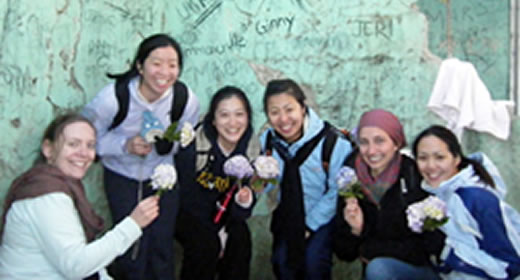
This spring, two Ford School students traveled to Jamaica's Blue Mountains. Their goal: to improve the efficiency and effectiveness of a free clinic run by the Blue Mountain Project.
The Blue Mountain summit is the highest in Jamaica: the mossy trail leading up to it crowded with colorful wildflowers, clusters of ferns, towering stalks of bamboo, and fragrant Eucalyptus trees. Nestled in that peak, just outside the country's capital in Kingston, is the community of Hagley Gap.
Farmers here grow Blue Mountain coffee, a gourmet crop they ship to buyers as far away as Japan. But while the coffee provides income for some residents, many others struggle to thrive in an area where unemployment can reach as high as 50 percent, close to four times the national average. To make ends meet, Hagley Gap's residents make seasonal treks to the United States to pick apples and harvest crops. Others travel to Kingston—only 10 miles away, but a three-hour drive along serpentine, unpaved, and sometimes flooded roads—to work in factory jobs.
The community's remote location and lack of roads cause other deprivations, too: in particular, poor access to health care. That's why five years ago, a U.S.-based non-profit, the Blue Mountain Project, began operating a volunteer clinic in Hagley Gap, adding another in nearby Penlyne Castle a few years later. Together, these clinics provide a source of basic care services for the 3,000 men, women, and children in the district.
In 2007, University of Michigan medical students began partnering with the Blue Mountain Project and traveling to Hagley Gap to provide free medical services. BlueLab, an engineering student group dedicated to sustainable development, joined them later, building an environmentally friendly biosand water filter to provide clean drinking water for the clinic first, and later solar dryers and biosand filters for farmers and schools. This spring, with funding from the school's Gilbert S. Omenn and Martha A. Darling Health Policy Fund, Ford School students joined the cause.
In May 2010, Karen Tam, a dual MPP and MBA student, led a team of six students from Students Engaged in Public Health to Hagley Gap. Their mission? To improve clinic operations and offer follow up trainings on maintaining the water filtration system. Emmanuelle Ravat-Francoise, a dual MPP and MPH student, joined Tam, focusing on resource management, including managing staff, volunteers, and medical supplies.
The group began by interviewing the two part-time nurses at the clinics to evaluate patient processes, staff concerns, medical records management procedures, and inventories. They then developed simple protocols to improve clinic operations and enhance efficiency, rehearsing them with the staff.
Most important was the process for working with the short term medical volunteer groups who come in to serve the community 4-6 times annually. While the medical clinics are open twice a week, staffed by the part-time nurses, they are only at full capacity when the medical students arrive. This food of patients and volunteers puts a strain on the staff, so Tam and her team worked with them to develop a handbook they could share with volunteers, explaining inventory procedures, medical record systems, and patient protocols.
While the medical clinics are open twice a week, staffed by the part-time nurses, they are only at full capacity when the medical students arrive. This flood of patients and volunteers puts a strain on the staff.
"Through the Blue Mountain Service Learning Project, I was able to put my studies into real practice to help an organization effectively use the limited resources it receives to improve the quality of health in the community," says Tam.
Not everything they did there felt like work though. Living with host families gave them a strong sense of Hagley Gap's close knit community. While the residents of Hagley Gap struggle financially, they retain a strong sense of community, and welcome visitors warmly. Tam and Ravat-Francoise picked up a few Patois phrases while in the area. "Mi glad mi go ap de blue mountain," says Tam. "I'm excited to go up the Blue Mountain."
Below is a formatted version of this article from State & Hill, the magazine of the Ford School. View the entire Fall 2010 State & Hill here.
Photos courtesy of Veronika Aasvestad.
